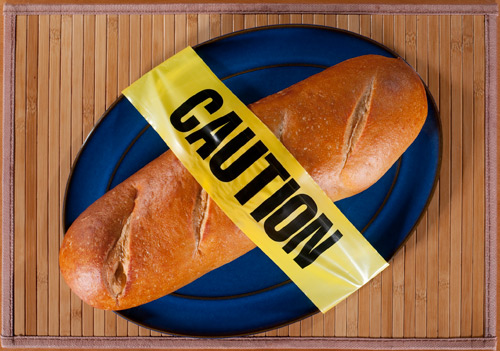“Why am I more sensitive to gluten than ever before?”
Post date: May 22, 2015
Author: Sarah Axtell, ND

 Have you noticed after eliminating a certain food for some time and then adding it back into your diet that you are more sensitive than ever before? Maybe you seemingly were able to eat pizza without any noticeable effects a few months back but then after eliminating it for awhile and upon reintroduction… you react with a vengeance.
Have you noticed after eliminating a certain food for some time and then adding it back into your diet that you are more sensitive than ever before? Maybe you seemingly were able to eat pizza without any noticeable effects a few months back but then after eliminating it for awhile and upon reintroduction… you react with a vengeance.
While this can be frustrating, I think it is a good sign that your body is getting cleaner and able to actually mount a response. I often liken it to smoking cigarettes. The first time someone tries a cigarette they often feel terrible in that moment- shaky, dizzy, nauseated with even the possibility of vomiting. Your body is clean prior to starting to smoke and once that toxin hits your system, you react pretty immediately. Long-time smokers don’t feel these acute symptoms. Of course, they are likely chronically tired and sluggish, but essentially their body is so toxic that they are not able to mount an acute response (as in the case of trying it that initial time).
Same thing with a toxic food such as gluten. You do an elimination diet for 4-6 weeks, start to feel miraculously better in terms of mood, skin, digestion and energy. You have cleansed your body of this toxic substance and then upon re-introducing it you react in ways you never had before- diarrhea, immediate bloating, skin eruptations (ie. acne or eczema), constipation or headache.
The cleaner your body gets, the more sensitive it can become. But I think that this is not such a bad thing as it keeps you on track for eating cleaner foods on a daily basis…as it is just not worth it to feel crappy after even just a few bites of something with gluten in it. Yes, in the short-term this can be frustrating that you cannot go out for pizza without getting a stomach ache. But in the long run, you are now experiencing not only better digestion but other benefits of a clean and non-toxic body, such as radiant skin, uplifted mood and improved energy.
It is normal and quite common to test the boundaries in the beginning stages of a gluten-free diet. Sometimes we get overly confident and think we can handle it and then our body tells us otherwise! We have to listen to what our body is trying to tell us and the healthier we become, the more clear-cut these messages are.
We all typically have a food or two that we cannot tolerate. Gluten and dairy are quite common. And elimination diets along with food sensitivity testing help us determine this.
But what is not healthy or normal is to continue to keep developing food sensitivities. I do see this- where initially a gluten-free diet was helping a patient with their symptoms. But then they start to react to everything and they are now able to only tolerate just chicken and squash. This is a sign of a leaky gut and/or an underlying infection, such as SIBO (Small Intestinal Bacterial Overgrowth). The long-term sustainable approach is to not keep eliminating foods. The solution is to address the underlying cause. In the case of SIBO, for instance, the bacteria must be eradicated in the small intestine, and the lining of the gut must be repaired for the body to tolerate more foods.
What to do if you accidently get “glutened” while dining out
I understand eating a strict gluten-free diet is not always feasible, especially when dining out at a restaurant or at a friend’s house. If you do get “glutened,” there are enzymes specifically formulated to combat the negative effects of microscopic contamination of gluten. They are not to be used with large amounts of gluten ingestion but rather in conjunction with a gluten-free diet in suspected gluten contamination. They are not meant to be used with “cheating” on a gluten-free diet, but rather to keep in your purse to have on hand in the event you get contaminated. Talk to your naturopathic doctor about whether or not these enzymes might be helpful.
Explore Related Posts:




